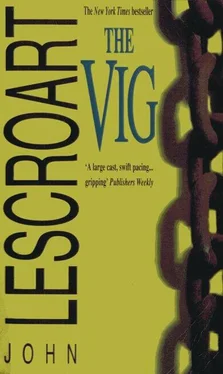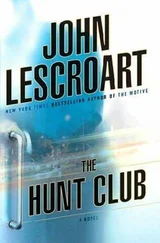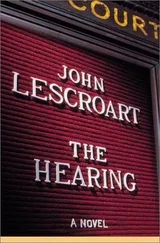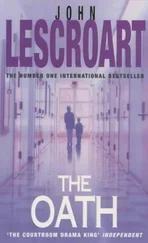John Lescroart - The Vig
Здесь есть возможность читать онлайн «John Lescroart - The Vig» весь текст электронной книги совершенно бесплатно (целиком полную версию без сокращений). В некоторых случаях можно слушать аудио, скачать через торрент в формате fb2 и присутствует краткое содержание. Жанр: Триллер, на английском языке. Описание произведения, (предисловие) а так же отзывы посетителей доступны на портале библиотеки ЛибКат.
- Название:The Vig
- Автор:
- Жанр:
- Год:неизвестен
- ISBN:нет данных
- Рейтинг книги:4 / 5. Голосов: 1
-
Избранное:Добавить в избранное
- Отзывы:
-
Ваша оценка:
- 80
- 1
- 2
- 3
- 4
- 5
The Vig: краткое содержание, описание и аннотация
Предлагаем к чтению аннотацию, описание, краткое содержание или предисловие (зависит от того, что написал сам автор книги «The Vig»). Если вы не нашли необходимую информацию о книге — напишите в комментариях, мы постараемся отыскать её.
The Vig — читать онлайн бесплатно полную книгу (весь текст) целиком
Ниже представлен текст книги, разбитый по страницам. Система сохранения места последней прочитанной страницы, позволяет с удобством читать онлайн бесплатно книгу «The Vig», без необходимости каждый раз заново искать на чём Вы остановились. Поставьте закладку, и сможете в любой момент перейти на страницу, на которой закончили чтение.
Интервал:
Закладка:
A mariachi band was serenading an American couple at the next table. Hardy poured his Tecate into a glass and squeezed a lime into the beer. He didn't particularly like Tecate, but he liked Corona less, and those were the options.
Sometimes, he'd told himself, you've just got to do something. And he thought he'd been sure.
Certain enough in any case to risk crossing the border with his.38 Special taped under the fender of his Samurai. He didn't want to think about what would have happened if they had stopped him in Tijuana and searched the car. But he'd driven into Mexico perhaps twenty times before in his life and had never been hassled going in. Coming back, of course, they'd inspected his car three or four times. Hardy had come to the conclusion that if people wanted to bring something-anything-into Mexico, the official word was bienvenidos. It was a poor country. They'd take anything you wanted to provide.
For the two and a half non-stop days that it had taken him to get here, sleeping only an hour or two at a time in the car, his hunch had grown more and more into a conviction. Rusty Ingraham was alive-and he was in Acapulco.
Rusty Ingraham, he had been sure, had come to him for no other reason than to have him point the finger at Louis Baker and let nature take its course. And that course ought to lead, with the other clever little games such as buying a gun, presumably for protection against Baker, that he never picked up, to the conclusion that Rusty was dead, killed by Louis Baker.
And that, in turn, gets Rusty off the hook for his crushing vig and puts Louis where he belongs back in the slammer. Or the gas chamber. Either way, Louis Baker was a pawn. Dismas Hardy was a tool. Rusty Ingraham would be free to live out poor Maxine's dream.
The sun kissed the Pacific. Flaming red bougainvillea covered the trellis that bounded the patio where he sat. A warm offshore breeze lulled. He sipped his Tecate.
Across the chasm that divided him from the divers, one of them, still torchless, fell forward. Hardy watched the slow arc as the body cleared the outcropping and fell the long long way down. It was the fourth boy he'd seen go off since arriving here, and he found he couldn't work up a casual touristy feeling about it.
He leaned out over the trellis, making sure the wave below would be there for the boy's arrival. This was not, to him, a relaxing way to unwind.
He left his beer with a tip and went out to the road leading back into town. Half a dozen taxis were lined at the entrance to the place, but he put his hands in his pockets and started walking down the hill.
Palm fronds still littered the roadway. Hurricane Carmine had hit two days before. It hadn't done much damage, but cleanup here did not proceed at the same pace as back home. Especially if you couldn't pay for it. The phone in his hotel still wasn't working, for example, but then again, he wasn't staying at the Princess.
He had arrived the day before and slept through the late afternoon and through the night-seventeen hours. This morning he'd walked down from his hotel, the El Sol (eighteen dollars per night-definitely not the Princess), near the base of the mountains, through the awakening town to the Esplanade. He took an outside table at a place facing the beach and had pineapple juice, some poor coffee and a plate of huevos rancheros, taking it slow, letting the sun get hot, the parasailors floating up around the bay like colored balloons.
Sunday morning. Church bells.
On his way out to the jai alai stadium, still walking, getting the feel of the place, he had stopped at a church and stood in the back, listening to the Mass in Spanish. The ritual appealed to him, but he wished they still said the Mass in Latin. There was nothing universal about this Mass, nothing, he thought, catholic. It made him feel like the foreigner he was here. At communion, he snuck back out.
The sun pounded hot on his head. He bought a hat for a dollar and continued walking.
Hardy loved Mexico. He went every year to fish or dive or soak up sun and either dry himself out or tank up-the place was good for either. He and Jane had taken their honeymoon at Cabo San Lucas long before it was anything but a sleepy fishing village with a thatched-roof airport. Long walks on empty beaches. Huge, nearly free margaritas at the Finis Terra, throwing the glasses down over the cliffs to the water below. Nights and afternoons and mornings of lovemaking.
Jane.
Driving down, he had had time to think about her, about Frannie. Part of him recognized that he might have decided to come down here, ostensibly seeking Rusty Ingraham, because Jane was due home from Hong Kong. It would give him a few more days. Not that it was the whole reason, and not that he was proud of it, but it was there.
He and Jane had both been supposing, in a casual kind of way, that eventually they would drift back into marriage. There would be no future talk of trying for another child -that had already come up and Jane's age, career and the tragedy with Michael had sealed her opinion on that far past the reaches of any discussion. She wanted-and Hardy did not blame her-comfort, respect, lack of hassle. A civilized life. He didn't blame her, but he didn't want the same thing.
She had already hinted more than once that Hardy would probably, eventually, go back to practising law, buy a few suits, become a professional. She would not force him to do any of that, of course, but it-probably-would come to pass naturally. The problem was, when it came to it, as it seemed to have done now, he knew he was going somewhere, moving toward some definite place after his years of laying low behind the bar of the Shamrock. Something was guiding him, and it wasn't some urge toward passivity and comfort, toward three-piece suits and a better wedge of Brie.
Maybe, four, five months ago, looking into the death of Frannie's husband, he'd come to believe, after years of denying the possibility, that one person-he, Dismas Hardy-could make a difference. And that it even mattered.
Else why was he down here?
Back to old Abe's tragic fallacy. Did he think he was down here to restore order to the cosmos? He had to laugh at that. But if Rusty Ingraham was here, he was going to bust his ass in a bad way. And he was going to get the charges dropped against Baker-the ones he'd influenced.
That was his mission. It was something Frannie might yell at him about. She might even hate him from time to time for being made up like that. But at least Frannie would know where he was coming from. He was, she said, like Eddie that way.
To Jane, the concept would be Greek.
Come on, Diz, was that fair?
Jane would understand it on a theoretical level. She would admit that the world might be better if everybody always did the right thing. Of course. But there were issues everywhere you looked, and you had to decide which ones were yours. And that decision had to be based on some kind of a cost-benefit analysis. Adults understood that. You didn't just go off and crusade your whole life. If you did, you were a professional do-gooder, and everybody knew they didn't get much done, did they?
But he wasn't crusading his whole life. He just wanted to get this one thing straightened out. It had been pushed in his face-it was his issue.
And he could hear Jane's answer to that. Why take the risk? If you did nothing, what would it matter? So what, Louis Baker is in jail-he deserves to be. Didn't he break into my house? Wasn't he trying to kill you? And if Rusty Ingraham is gone, let him go. Who cares? He's gone, it's over.
But Jane, he killed Maxine Weir.
I'm sorry. Police business. Not yours. Let it go…
He had come up to the stadium, deserted and empty, and looked at his watch. The first game wouldn't be for a couple of hours. He shook his head-bad timing-and backtracked toward town.
Читать дальшеИнтервал:
Закладка:
Похожие книги на «The Vig»
Представляем Вашему вниманию похожие книги на «The Vig» списком для выбора. Мы отобрали схожую по названию и смыслу литературу в надежде предоставить читателям больше вариантов отыскать новые, интересные, ещё непрочитанные произведения.
Обсуждение, отзывы о книге «The Vig» и просто собственные мнения читателей. Оставьте ваши комментарии, напишите, что Вы думаете о произведении, его смысле или главных героях. Укажите что конкретно понравилось, а что нет, и почему Вы так считаете.












